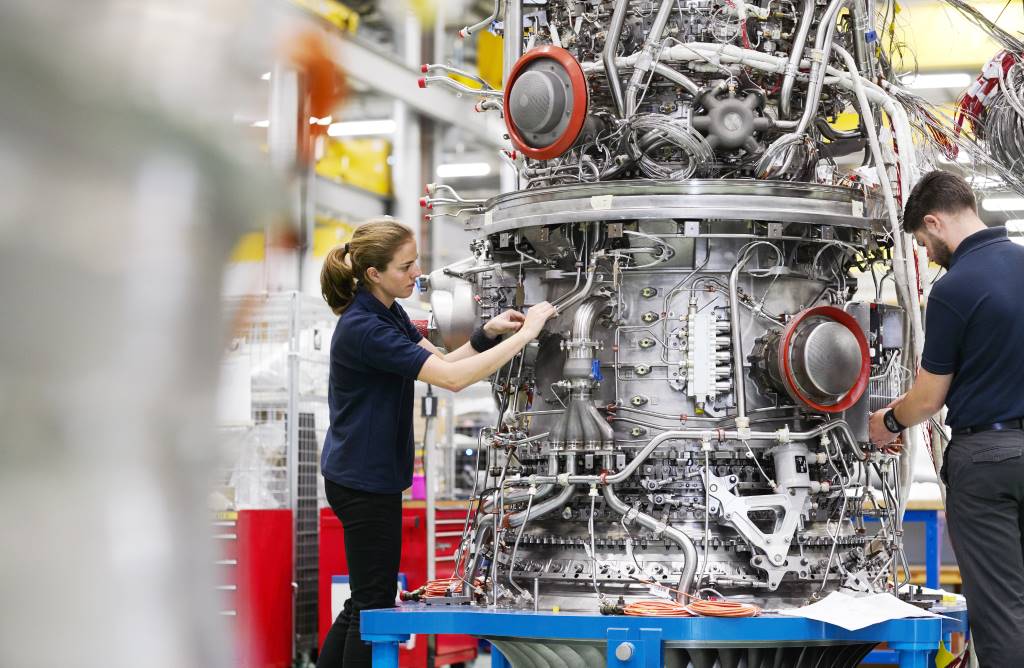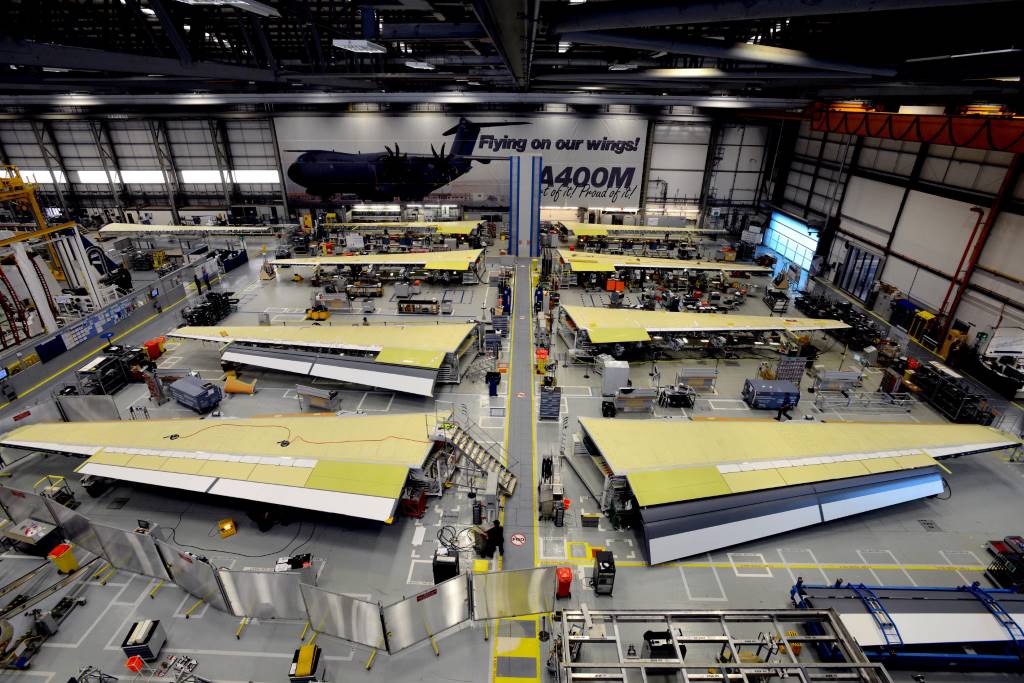
Two engineers working on civil aerospace engine Advanced Low Emission Combustion (ALECSYS), in Bristol, United Kingdom
Supporting business growth in the region, the West of England Combined Authority showcases the wealth of aerospace R&D, design and manufacturing companies that work to provide a hotbed of talent across the region.
The West of England’s aerospace and advanced engineering sector is worth over £2.7 billion and it is home to the UK’s largest aerospace cluster. The area is Europe’s aerospace powerhouse, with specialist expertise in areas like composites, robotics, and additive manufacturing.
The West of England is a location ideally positioned to meet this demand, with an established aerospace cluster sitting alongside a growing tech and digital capability. By locating in the region, you will be able to exploit an array of aerospace and aviation assets, capabilities and well-trained personnel who play an integral role in the global aerospace industry.
Over 10 world-leading aerospace companies are based here, such as Airbus, GKN Aerospace, BAE Systems, Rolls-Royce, Leonardo Group, and Boeing. Their supply chains lead in aerospace R&D and design. These businesses feed the manufacture of aircraft, helicopters, military transport, satellites, and communication systems across the country and globally.
The region is home to the National Composites Centre (NCC) which is one of seven world-class centres comprising the UK’s High Value Manufacturing Catapult (HVMC) research centre. Here, businesses of various sizes and sectors can access new technology and specialist engineers to drive innovation for composites.
Q) Firstly, what is your region’s aim?
Innovation from our region plays a key role in the global shift to a zero-carbon economy, and we have ambitious goals to be net zero by 2030. There’s a marked shift towards a greener economy and we are leading the way.
The West of England is a world leader in smart and sustainable aviation, building on a rich aerospace and advanced engineering heritage while simultaneously embracing disruptive innovations and technologies. Airbus, Rolls-Royce, and GKN Aerospace are undertaking ground-breaking activities at sites in the region to contribute to their global corporate sustainable aviation and zero emissions goals.
Hydrogen aviation, in particular, is now emerging as an industry priority. This is shown by Airbus’ ZEROe hydrogen-powered concept aircrafts and the £54.4 million H2GEAR hydrogen propulsion project led by GKN Aerospace. From urban air mobility (UAM) vehicles to next generation propulsion systems, from electric aviation to alternative aviation fuels, the West of England unlocks impressive opportunities. Bristol is also home to UAM company, Vertical Aerospace.
A unique opportunity exists for investors to join this future-oriented community – creating the markets of the future, bringing to life the most sophisticated aviation and air mobility products, services and solutions, and enhancing the sustainability of the future air transport system technologies of the future.
Q) What kinds of capabilities can companies in the region offer aerospace OEMs?
We are global leaders for smart and sustainable aviation. The region offers an exceptional opportunity for an investor to plug into a world-leading smart and sustainable aviation ecosystem. Here, you are able to play an instrumental role in the development, demonstration and adoption of new and emerging aviation and advanced air mobility markets, taking full advantage of electrification, hydrogen, autonomy and disruptive technologies.
Q) How is the region responding to the OEMs demand signals for new and advanced technological innovations in the future?
We are a world-class centre of excellence bringing together innovative businesses with leading R&D. Key facilities include the NCC, Bristol Robotics Laboratory, Institute of Advanced Automotive Propulsion Systems, Centre for Future Clean Mobility and the Centre for Modelling & Simulation (CFMS).

We collaborate and provide solutions in partnership with a growing cluster, including major global aerospace companies, plus disruptive innovative companies like Vertical Aerospace and Ampaire. Airbus is strengthening its presence in the UK with the launch of a Zero Emission Development Centre for hydrogen technologies at Filton near Bristol.
Q) What key aerospace programmes is the region is actively engaged with?
The region’s firms are supported by new ‘disruptive technology’ facilities. This includes the University of Bath’s new Institute of Advanced Automotive Propulsion Systems, which supports joint research and 300 new engineering jobs. Additional developments include the Airbus Wing Integration Centre and the NCC’s announcement of a further £36.7m investment in its current facility.
We are involved in a number of Future Flight programmes, as well as Airbus’ ZEROe programme, and GKN’s H2GEAR programme. The West of England Aerospace Forum, which connects members to major industry and government decision makers, is based in the region. Productivity in the sector has grown by 30% since 2015, three times the UK average.
Q) Is the region obtaining R&D funding to keep pace with manufacturing changes and production methodologies?
Digital Engineering Technology & Innovation (DETI) is a strategic programme of the West of England Combined Authority. It’s delivered by the NCC in partnership with the CFMS and Digital Catapult, as well as three leading universities: UWE, Bristol, and Bath. Industry partners include Airbus, GKN Aerospace, Rolls-Royce, and CFMS. DETI is funded by £5m from the Combined Authority, with co-investment from the High Value Manufacturing Catapult and industry.
DETI unites engineering companies, digital technology pioneers, and universities to shape the future of digital engineering, securing the UK’s engineering leadership. It helps businesses adopt the technology and processes they need to accelerate digital engineering capabilities and embed digital into their operations.
Q) What is the region doing to help enthuse young people to take up a career in the aerospace manufacturing industry?
In addition to the 51,000 aerospace, manufacturing and advanced engineering jobs, the region is home to four world-class universities attended by over 39,000 STEM students. Aerospace Bristol is a facility run by the Bristol Aero Collection Trust to promote the region’s heritage and strengths in engineering, and to advance STEM engagement with younger generations.
The British Engineering Manufacturers Association (BEMA) provides apprenticeships and training to a number of tier one aerospace companies in the West of England. Bristol’s Advanced Engineering Centre delivers specialist courses in engineering, aeronautics and manufacturing. South Gloucestershire and Stroud College employs over 600 apprentices per year for employers across a range of sectors. Its Filton campus provides Level 3 pathway courses for students studying aerospace engineering and mechanical engineering.
Q) Are you actively courting overseas companies to consider moving their manufacturing facilities to the area?
We support business growth in the region. Invest Bristol & Bath (IBB) is the inward investment service for the West of England Combined Authority. We support businesses who are seeking to enter the region to grow, innovate and collaborate through a range of services, tailored to your business requirements. Our team is experienced, knowledgeable and well connected.

Some of the services we offer include: Bespoke research and provision of regional economic information to support business planning and regional understanding; Talent support in accessing and recruiting high quality staff; Support in identifying the right property and location for your business; Relocation Advice, support and assistance for relocating staff; Simplified access to relevant council, regional business services and suppliers; Introduction to cluster networks; meet-ups and event activity in the region; Ongoing support ensuring your business continues to develop and grow; Internationalisation support through invitations to join virtual and trade missions, links to the Department for International Trade.
Through Invest Bristol & Bath we will continue to attract new investment, development and employment for the region to accelerate our economy, and ensure it remains a thriving, successful place for the future.
